|
|
|
Sort Order |
|
|
|
Items / Page
|
|
|
|
|
|
|
| Srl | Item |
| 1 |
ID:
158725
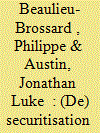

|
|
|
|
|
| Summary/Abstract |
This article theorises the simultaneous enaction of securitising and desecuritising moves. It argues that the frequent simultaneity of these two processes, which are normally considered mutually exclusive within Securitisation Theory (ST), has previously gone unnoticed given a set of methodological, temporal, and ontological biases that have developed within ST. Demonstrating how these biases can be overcome – and even reconciled with the seminal texts of ST – by drawing on work from within social theory and elsewhere, we argue that the frequent simultaneity of (de)securitising moves most urgently requires us to reconsider the normative status of desecuritisation within ST. Although desecuritisation has traditionally been viewed as normatively positive, we argue that its temporally immanent enaction alongside securitising moves might introduce more violence into security politics and, in fact, exacerbate protracted conflicts. Ultimately, we make the normative ambitions of some within ST more opaque. Desecuritisation is not a shortcut to the ethical-political good within ST.
|
|
|
|
|
|
|
|
|
|
|
|
|
|
|
|
| 2 |
ID:
116127
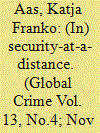

|
|
|
|
|
| Publication |
2012.
|
| Summary/Abstract |
The article examines the progressive de-bounding of social risks and the blurring boundaries between internal and external notions of security. Contemporary forms of cross-border connectivity bring to our attention the renewed importance of analysing distance (physical, social and other) in criminology. Globalising processes significantly expand the scale and scope of social interaction, including violent conflict and crime control and security strategies, by offering social agents a possibility of acting from the point of 'strategic globality'. The article outlines an emerging landscape of 'security at a distance', where previously local and national phenomena are transformed by new forms of transnational connectivity, risk and movement. It suggests that, through the emerging forms of globalism, criminal justice is plugging into trans-border circuits of circulation of people, forms of knowledge and social and political action, where, ultimately, crime control can become an export and war can be, metaphorically, seen as an import.
|
|
|
|
|
|
|
|
|
|
|
|
|
|
|
|
| 3 |
ID:
177863
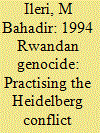

|
|
|
|
|
| Summary/Abstract |
Having suffered one of the worst genocides in recorded history, Rwanda today is a country still striving to maintain the equilibrium between the perpetrators and the survivors. After decades of tension between the Hutu majority and the Tutsi minority, during April to July 1994 an estimated 500,000 to 800,000 people were slaughtered in mass atrocities, with many more displaced from their homes. Political instability, discrimination, traces of colonialism, poverty and competition for power were some of the causes of this horrific extermination. Rwanda has been working ever since to recover from the aftermath of the events that culminated in this government-sponsored slaughter, and has achieved remarkable success – especially in terms of its economy. This study aims to explore the nature of the 1994 genocide against the Tutsi in Rwanda. Fundamentally, it seeks to quantify the intensity and unprecedented nature of the genocide. Understanding how genocides such as this one occurred is crucial for preventing similar future atrocities.
|
|
|
|
|
|
|
|
|
|
|
|
|
|
|
|
| 4 |
ID:
118311
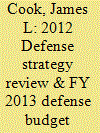

|
|
|
|
|
| Publication |
2013.
|
| Summary/Abstract |
Regardless of whether one is a supporter or a critic, some additional analysis regarding the formulation of the new defense strategic guidance is useful to better understand the rationale for changing defense priorities, the magnitude and impact of these changes within the Department of Defense (DOD), and the review process itself. Specifically, three questions warrant further examination: 1) Why was a DoD-level defense strategy review necessary, given the 2010 Quadrennial Review? 2) What are the implications of this new strategic guidance for the DoD? 3) What are the strategic risks? These questions are addressed by assessing the defense strategic guidance through the lens of strategy and its components: ends, ways, means and risk.
The United States of America is the greatest force for freedom and security that the world has ever known. And in no small measure, that's because we've built the best-trained, best-led, best-equipped military in history - and as Commander-in-Chief, I'm going to keep it that way.
|
|
|
|
|
|
|
|
|
|
|
|
|
|
|
|
| 5 |
ID:
131095
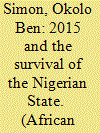

|
|
|
|
|
| Publication |
2014.
|
| Summary/Abstract |
Nigeria is currently faced with serious domestic challenges. While the state is not officially at war, it is standing on the precipice, especially with the eruption of violence occasioned by the emergence of the Boko Haram sect and the tenuous peace in the Niger Delta. With the 2015 general elections on the horizon, fears of further violence and disintegration are rife, more so because of the debate over who occupies the Presidential Villa at Abuja. President Goodluck Jonathan, a southerner, seems poised for a comeback even amidst the vociferous challenge posed by the political elites of northern Nigeria. This article looks at the different scenarios that might play out in 2015. It analyses the challenges of the survival of the Nigerian state, and makes some policy recommendations that Nigeria and its people need to put into place in order to ensure its survival beyond 2015.
|
|
|
|
|
|
|
|
|
|
|
|
|
|
|
|
| 6 |
ID:
112621
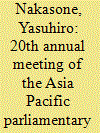

|
|
|
| 7 |
ID:
052535
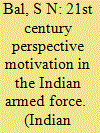

|
|
|
|
|
| Publication |
Apr-Jun 2004.
|
|
|
|
|
|
|
|
|
|
|
|
|
|
|
|
| 8 |
ID:
086828
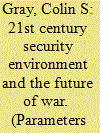

|
|
|
|
|
| Publication |
2009.
|
| Summary/Abstract |
Defence planning needs to be based on political guidance, and taht guidance should make its assumptions explicit. Sometimes we neglect this, and oversight can prove costly. Conditions, which is to say contexts, can change, and so shold the working assumptions behind policy.
|
|
|
|
|
|
|
|
|
|
|
|
|
|
|
|
| 9 |
ID:
065366
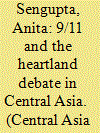

|
|
|
| 10 |
ID:
077028
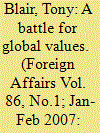

|
|
|
|
|
| Publication |
2007.
|
| Summary/Abstract |
The war on terrorism is not just about security or military tactics. It is a battle of values, and one that can only be won by the triumph of tolerance and liberty. Afghanistan and Iraq have been the necessary starting points of this battle. Success there, however, must be coupled with a bolder, more consistent, and more thorough application of global values, with Washington leading the way.
|
|
|
|
|
|
|
|
|
|
|
|
|
|
|
|
| 11 |
ID:
056462
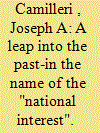

|
|
|
| 12 |
ID:
120176
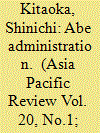

|
|
|
|
|
| Publication |
2013.
|
| Summary/Abstract |
The second Abe administration, inaugurated on December 26, 2012, has been called a repudiation of the Democratic Party of Japan (DPJ) rather than a strong endorsement of the Liberal Democratic Party (LDP). However, in the intervening months, public support has risen. Going forward, the Abe administration faces three serious challenges, namely the economy, security and foreign policy, and a strategy to win in the Upper House elections expected in July 2013. This article analyzes each of these challenges and explores possible courses that the administration could take.
|
|
|
|
|
|
|
|
|
|
|
|
|
|
|
|
| 13 |
ID:
057483
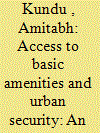

|
|
|
| 14 |
ID:
134072
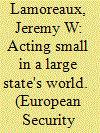

|
|
|
|
|
| Publication |
2014.
|
| Summary/Abstract |
The interest in small states ebbs and flows as important international affairs include small states. Russia's actions and policies vis-à-vis Ukraine, and the resultant intensified apprehension among Russia's smaller neighbours, aim the proverbial microscope at the size and power discrepancies between states. Russia, by most metrics, is a large state and the Baltic states, by those same metrics, are small states. Small-state scholars expect large and small states to act differently. However, the case of Russia and the Baltic states indicates that large and small states do not, in fact, act all that different. This being the case, this article calls into question many of the assumptions made by small-state scholars about the difference between large- and small-state action and argues for changes within small-state studies as a subdiscipline of the larger international relations discipline.
|
|
|
|
|
|
|
|
|
|
|
|
|
|
|
|
| 15 |
ID:
019660
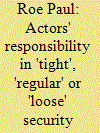

|
|
|
|
|
| Publication |
March 2001.
|
| Description |
103-116
|
|
|
|
|
|
|
|
|
|
|
|
|
|
|
|
| 16 |
ID:
052601
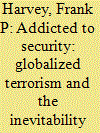

|
|
|
|
|
| Publication |
Winter 2003-04.
|
|
|
|
|
|
|
|
|
|
|
|
|
|
|
|
| 17 |
ID:
093560
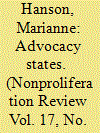

|
|
|
|
|
| Publication |
2010.
|
| Summary/Abstract |
While the current momentum for the elimination of nuclear weapons can be traced in part to the highly influential 2007 and 2008 Wall Street Journal opinion articles by George Shultz, William Perry, Henry Kissinger, and Sam Nunn, a more accurate picture of this momentum must take into account the role played by what are called here the "advocacy states." Motivated by a combination of humanitarian and strategic concerns, and mindful of the dangers of deterrence as well as proliferation, accidental use, and terrorist acquisition of nuclear material, these states have, for the past fifteen years, mounted a steady and repeated call for nuclear disarmament. Their activities have taken two main forms: the preparation of various state-sponsored reports investigating the utility and attendant dangers of nuclear weapons and making a strong case for nuclear disarmament; and the formation of like-minded groupings of states, namely in the New Agenda Coalition and the Seven-Nation Initiative, that are active in diplomatic forums and in practical projects. This article assesses the advocacy states' activities and shows that the states' reports and groupings increasingly focus on providing research, expertise, and technical assistance for the challenges facing disarmament. The article examines briefly the question of extended nuclear deterrence and disarmament (given that many of the advocacy states are Western allies) and considers the likely future role and activities for advocacy states. The author argues that these states have played a vital role in creating a climate in which the Obama administration can engage the movement toward disarmament.
|
|
|
|
|
|
|
|
|
|
|
|
|
|
|
|
| 18 |
ID:
096071
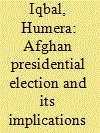

|
|
|
| 19 |
ID:
155116
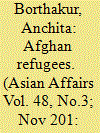

|
|
|
|
|
| Summary/Abstract |
One of the most important arenas that have been profoundly affected by the security situation in Afghanistan is Pakistan's internal security environment. The instability in Afghanistan has had a negative spill-over effect on Pakistan's domestic security scenario, as the Afghan quagmire poses immense implications on Pakistan's domestic framework. One of the important consequences of the Afghan conflict since the 1970s has been the massive inflow of the Afghan refugee population to the neighbouring Pakistan which in following years has brought about a number of demographic and security challenges to the Pakistani society. Therefore along with a number of factors, at this present juncture, Afghan refugees have also become a principal factor in determining Pakistan's Afghanistan policy.
|
|
|
|
|
|
|
|
|
|
|
|
|
|
|
|
| 20 |
ID:
169230
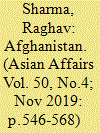

|
|
|
|
|
| Summary/Abstract |
This article discerns the shifts in China's engagement with its Western neighbour, Afghanistan. Beijing's approach has gradually shifted from dis-interest to a careful re-calibration of strategy indicating Afghanistan's growing eminence in its strategic calculus. This transposition – dating back to the 1980's – it is argued has been accentuated as the ‘West’ weans itself away from the Afghan theatre. This article demonstrates that Beijing's chequered history of engagement with Kabul has been historically underpinned by its engagement with a plethora of actors identified with ‘political Islam’ who in turn are patronized by its allies in Rawalpindi. Its deepening footprint in contemporary Afghanistan while continuing to be coloured by the prism of Rawalpindi, is informed by a growing sense of unease regarding the perceived adverse imprint that developments across China's Western borders are likely to leave on its domestic security and growing economic interests in the region.
|
|
|
|
|
|
|
|
|
|
|
|
|
|
|
|
|
|
|
|
|